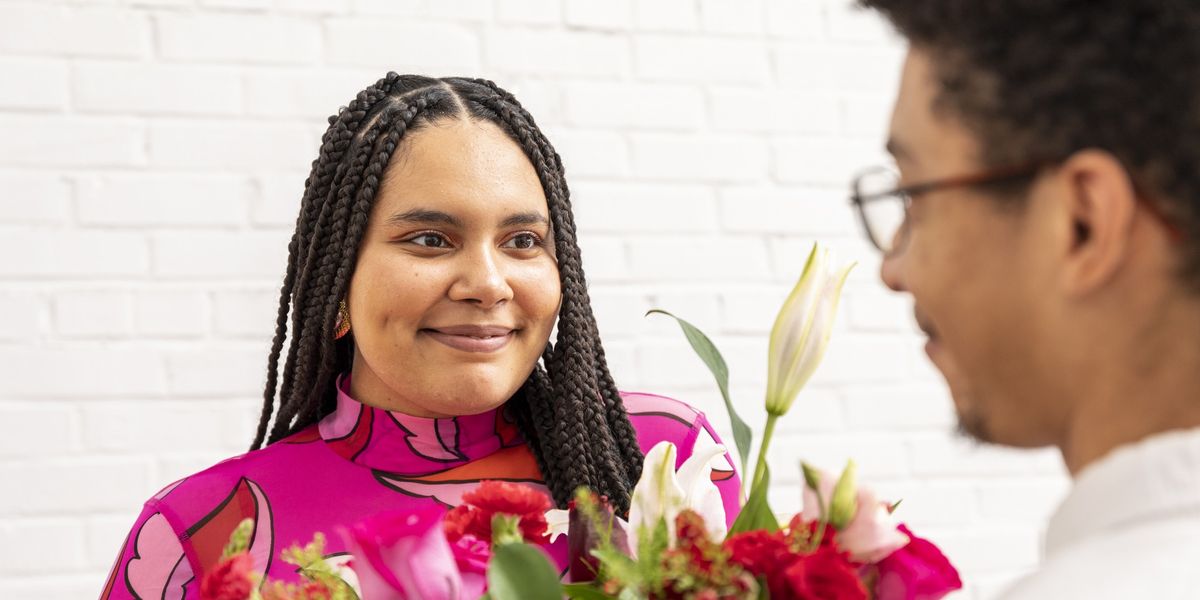
A Therapist Breaks Down The Internet's Fixation On The Black Cat-Golden Retriever Dynamic
In the realm of love and relationships, there's a growing interest in the idea of opposites attracting. This concept is gaining traction on platforms like TikTok, where users explore how different personality types interact in romantic partnerships. One popular comparison is between the "golden retriever" and "black cat" archetypes.
According to Urban Dictionary, the golden retriever, typically portrayed by men, embodies a relaxed and friendly demeanor, making relationship maintenance seem effortless. These individuals are described as easygoing, patient, loyal, socially adept, and optimistic. On TikTok, many women are intrigued by the prospect of finding partners with these qualities.
In contrast, the black cat, often represented by women, leans towards introversion and independence. They're mysterious, quiet, and introspective, preferring to be pursued rather than doing "the chasing" in relationships.
@annakrstna Replying to @BeckyAmi part II coming soon❤️ #femmefatale #blackcat #blackcatenergy #dating #marriage #datingadvice #princesstreatment #feminine #feminineenergy #relationship #sprinklesprinkle #celebrity #femininenergy #love
This dichotomy reflects the anxious-avoidant attachment dynamics in psychology (pursuer-distancer cycle), where one partner seeks closeness (golden retriever) while the other values autonomy (black cat).
The Black Cat Golden Retriever Archetypes & Attachment Styles
Attachment theory suggests that early caregiving experiences shape our attachment styles, influencing how we relate to others. Anxious individuals seek reassurance, while avoidant individuals prioritize independence. However, not every instance of the black cat/golden retriever dynamic indicates underlying insecurities. Individuals can embody these personas without necessarily being insecure or exhibiting unhealthy attachment patterns.
For instance, a golden retriever's desire for closeness may come from a secure attachment style, rooted in self-worth and trust in others. Conversely, a black cat's preference for autonomy doesn't always indicate avoidance; they may simply value their independence, and it's relatively easy for them to connect and disconnect when needed. Understanding these dynamics requires personalized individual/couples assessment, ideally with a licensed therapist.
Black Cat Golden Retriever: Why the Man Needs To Like the Woman More
A prevailing notion in this discussion that's sparked a lot of conversation is the idea that when a woman takes on the role of the golden retriever in a relationship with a black cat partner, the dynamic is more likely to fail. (I've experienced this firsthand, even in my own past relationships, and I've seen it play out in my own life.) Conversely, when the roles are reversed, the relationship tends to thrive. But why does this happen?
Historically, men have been socialized to take on the role of the pursuer, while women are expected to be more passive recipients of romantic advances. From a biological standpoint, some researchers argue that evolutionary instincts may play a role in shaping mating behaviors. Evolutionary psychology suggests that men may be inclined to pursue potential mates to maximize their reproductive success. This perspective suggests that men may have evolved to seek out partners and compete for their attention and affection.
@annakrstna Replying to @Tina Kaur #love #dreamgirl #beauty #relationship #dating #datingadvice #femmefatale #feminineenergy #desire #obsession #darkpsychology #sprinklesprinkle #femininity #psychology #selflove
Additionally, societal expectations and cultural norms can heavily influence gender roles and relationship dynamics. From a young age, boys may be socialized to take initiative, assert themselves, and pursue their romantic interests actively. On the other hand, girls may be encouraged to adopt more passive roles, waiting for suitors to express interest or make romantic gestures.
As much as there's a lot of conversation about gendered expectations and societal norms, it's crucial to recognize that these expectations aren't universally applicable. Not all individuals adhere to traditional gender norms, and people express a wide array of behaviors and preferences in romantic relationships. Research indicates that attitudes towards pursuit and courtship have evolved over time and differ across cultures.
In today's society, there's a growing recognition of the significance of mutual consent, communication, and reciprocity in romantic relationships. Many individuals, irrespective of gender, prioritize egalitarian principles and seek partnerships founded on mutual respect, understanding, and collaborative decision-making.
The Black Cat & The Problem With 'Acting' Secure in Dating
Delving deeper, there's a growing conversation surrounding the distinction between acting secure and authentically embodying security in relationships. True security stems from a deep-rooted sense of self-assurance and a healthy understanding of one's needs and boundaries. Secure individuals don't feel compelled to mask their vulnerabilities or play games to attract a partner; they attract healthy relationships by being genuine and self-assured.
Contrastingly, attempting to mimic secure behavior without addressing underlying insecurities can lead to relational pitfalls. Pretending to be nonchalant or aloof may initially attract a partner, but it ultimately creates a façade that crumbles under the weight of emotional triggers and unresolved attachment wounds.
Authenticity and vulnerability form the bedrock of secure relationships, fostering trust and mutual understanding.
Most importantly, whether you identify as a black cat or a golden retriever in relationships, it's best to find someone who genuinely loves you for who you are. Connect with people who appreciate you instead of engaging in games or "acting secure," because even secure individuals have vulnerabilities and weaknesses. People need to see the real you to truly connect with you.
Transitioning from acting secure to being secure requires introspection and self-awareness. Here are some tangible tips to cultivate genuine security in relationships:
1. Reframe Your Beliefs About Love and Relationships:
Challenge any negative beliefs or misconceptions you may hold about love and relationships. Recognize that healthy relationships are built on mutual respect, trust, and compatibility, rather than scarcity or desperation.
Cultivate a mindset of abundance, believing that there are plenty of opportunities for meaningful connections and fulfilling partnerships; you just have to be the person you want to attract and refrain from entertaining anything less.
2. Develop Self-Confidence:
Invest in building your self-confidence and self-worth independent of external validation or romantic relationships. Foster a sense of independence and autonomy in your life. Develop interests, goals, and aspirations that are separate from your romantic relationships, and invest in your personal growth and development. Engage in activities and hobbies that bring you joy and fulfillment, and don’t abandon those hobbies just because you met someone new or you’re in a new relationship.
3. Set Realistic Expectations:
Avoid placing unrealistic expectations on yourself or your partner in relationships. Recognize that no relationship is perfect, and both partners will inevitably experience challenges and setbacks. Instead of striving for perfection, focus on building a strong foundation of mutual respect, understanding, and communication. Embrace the ups and downs of relationships as opportunities for growth and learning.
4. Emotional Regulation:
Develop healthy coping mechanisms for managing emotions and navigating conflict constructively. Prioritize self-care and cultivate resilience in the face of challenges.
5. Practice Patience and Acceptance:
Understand that finding a compatible partner and building a fulfilling relationship takes time and patience. Avoid rushing into relationships out of desperation or fear of being alone. Trust in the process and have faith that the right person will come into your life at the right time. Practice acceptance of yourself and others, recognizing that everyone has their own journey and timeline when it comes to love and relationships.
Let’s make things inbox official! Sign up for the xoNecole newsletter for love, wellness, career, and exclusive content delivered straight to your inbox.
Featured image by Amber N Ford/Getty Images
This article is sponsored by Hulu.
UnPrisonedhas returned for its highly anticipated second season, delving deeper into the complex dynamics of the Alexander family.
The series premiere comes a year after its debut season garnered rave reviews from fans and critics and earned record-breaking ratings for Hulu's Onyx Collective brand. UnPrisoned's success can be attributed to its raw, relatable themes and comedic appeal.
Inspired by creator Tracy McMillan's life, the show follows Paige (Kerry Washington), a therapist and single mother whose life takes an unexpected turn when her father, Edwin (Delroy Lindo) --who was released from prison-- moves in with her and her teenage son, Finn (Faly Rakotohavana).
Throughout UnPrisoned's first season, viewers witnessed how Edwin's incarceration deeply affected Paige's life and relationships. In the series, Paige unpacks her trauma through interactions with her inner child and her online followers. Meanwhile, Edwin is overcoming specific struggles with his own past that led to his life of crime, including a dysfunctional upbringing and his mother's arrest. As the Alexanders attempt to reconcile, new challenges arise.
This new season promises to further explore their unconventional family dynamic. Here are several compelling reasons why season two of UnPrisoned should be on everyone's watchlist.
The Alexander Family Life Is Still In Shambles
UnPrisoned's second season resumes where the series left off, with Paige grappling with the fallout from her troubled therapy practice and Edwin navigating life independently after moving out. Meanwhile, Finn faces his own challenges. The teenager is battling anxiety and seeking information about his father—a topic Paige avoids discussing.
The Alexander Family Are Attending Therapy To Resolve Their Underlying Issues
Amid the chaos in their lives, the Alexander family decides to mend their bond by confronting their past traumas. They seek professional help and attend therapy sessions with a “family radical healing coach,” played by John Stamos, a new cast member. This collective effort aims to unravel the complexities of their shared history and strengthen their relationships.
The process of unraveling each character's internal conflicts and their potential impact on future relationships may clash with Paige's textbook therapy approach. While Paige is used to being in the therapist's seat in both career and family, this forces her into the unfamiliar role of a patient during therapy sessions. This shift would compel her to look in the mirror and try a radically different approach.
The Alexander Family Learned A Big Lesson During A Therapy Session
In therapy, the Alexanders are tasked with addressing their individual traumas to salvage their remaining relationships. One of the family therapist’s eccentric suggestions was an exercise involving a family wrestling match. During this session, Paige faces tough questions about her refusal to share information about Finn's father.
While it's unclear whether this scene is reality or fantasy, the image of the family duking it out in the ring certainly makes for hilarious yet compelling television.
Paige Tries Dating Again Following Failed Relationships
Amid her life's chaos, Paige decides to step back into the dating field. However, her many attempts have left her with mixed results. The dating apps have turned out to be a fail, and an outing with her ex Mal (Marque Richardson), who is also her father's parole officer, doesn’t go quite as expected after he brings an unexpected guest – his new girlfriend.
The situation takes an awkward turn when Mal's new partner learns why the former couple split, partly due to Paige's self-sabotage.
UnPrisoned Is A Perfect Balance Of Comedy And Drama
As a dramedy, UnPrisoned takes a comedic approach to its heavy subjects. The show takes us on a ride with Paige's dating misadventures and navigating a friendship with her ex.
Other lighthearted moments include Edwin's attempts at CPR based on online videos and, of course, the antics of the Alexander family's unconventional new healing coach.
The second season of UnPrisoned is now available on Hulu.
UnPrisoned | Season 2 Trailer | Hulu
Feature image courtesy
Blair Underwood Initially Turned Down 'Sex And The City' Because 'It Was About How Samantha Was Fascinated By Dating A Black Man’
Actor and heartthrob Blair Underwood is opening up about why he turned down Sex and the City the first time he was offered a role. Many fans of the HBO series may recall Blair's time on the show in which his character was dating Miranda (Cynthia Nixon). However, he was previously offered another role where his character would date Samantha (Kim Cattrall).
During his interview with AV Club, the Set It Off star revealed that he was uncomfortable with the initial offer due to the character's fascination with him being a Black man.
“I actually did say ‘no’ the first time,” he said. “The first time they had offered the role, to be honest with you, it was about how Samantha was fascinated by dating a Black man and wanted to know if, uh, all of the rumors were true about our anatomy! And I said, ‘Listen, I’m honored, thank you, but I just don’t want to play a character based on race, on curiosity about a Black man.'”
But that didn't stop them from reaching out again. This time he was offered to play Dr. Robert Leeds, the love interest to Miranda and he decided to go for it. "So they were nice enough to call about a year later, and I said, 'Well, is it gonna be about race?' And they said, 'No, no, no, we’re not even gonna mention race!' And I think it really did only come up maybe once," he recalled.
"It did five episodes, and I think Samantha mentioned it once, saying something about 'a Black doctor' that Miranda was dating. And that’s really been a consistent thing in my career: not wanting to be boxed as 'the Black guy.'
"I’ve had that conversation with many producers along the way, and they were so great. They said, 'No, he’s just a doctor who Miranda meets in the elevator, and they have a nice little fling.' And it was amazing."
Blair has had a wide-ranging career playing everything from a lawyer on L.A. Law to playing Madame CJ Walker's husband on Self Made: Inspired by the Life of Madame CJ Walker. And during his interview, he revealed another role that he initially turned down, Set It Off. The movie, which is considered a classic in Black culture, stars Queen Latifah, Jada Pinkett Smith, Vivica A. Fox, and Kimberly Elise. Blair's character, Keith, played a banker and love interest to Jada's character, Stony.
He explained why he said no at first and eventually accepted the offer. "I had initially said “no” to that. Because I was playing this historic, iconic African-American historical figure in Jackie Robinson, and the time, y’know, there was Boyz N The Hood, and Menace II Society was out there, and I’d finished playing this noble Negro… [Laughs]," he said.
"And I’m reading the script, and there’s a scene where Jada Pinkett’s character—Jada Pinkett-Smith now—was going to sell her body so she could make some money to send her brother to college. And I remember, honestly, I threw the script across the room. I was, like, “I don’t want to do this. I want to do something uplifting for the Black culture and Black characters, and I don’t know if I want to see this.”
After a conversation with the movie's director F. Gary Gray and the actor's manager encouraging him to finish reading the script, Blair had a change of heart. What he first thought about the movie turned out to be totally different.
"So I finished the script, and I saw that the character they were asking me to play was really the love story in the midst of all of this turmoil of all of these characters, the four ladies: Queen Latifah, Vivica Fox, Kimberly Elise, and Jada," he explained.
"It was so well-written, it was such a great platform for them. And to be able to play the love story and the storyline that gave Jada’s character a leg up and a way out of this world, something to hope for, to wish for, someone to love her… I said, 'You know what? I’d like to be a part of that.'
"And I’m so glad I did, because that film resonates to this day. People all the time come up to me and say that they love that movie. So I’m glad that I did it."









